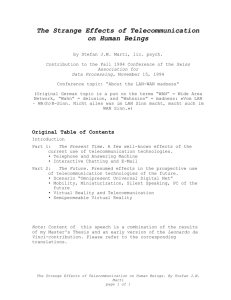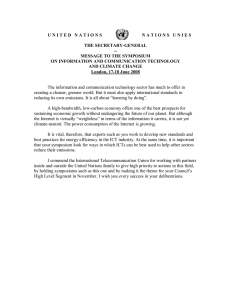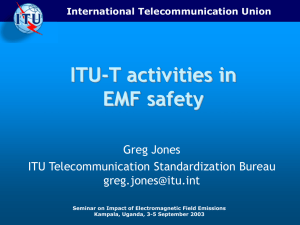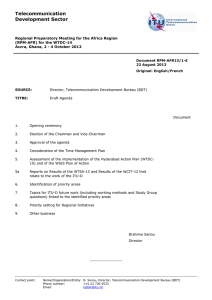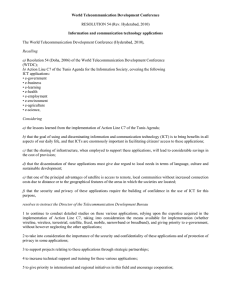ITU-T Study Group 5 Publications Greg Jones ITU Telecommunication Standardization Bureau
advertisement
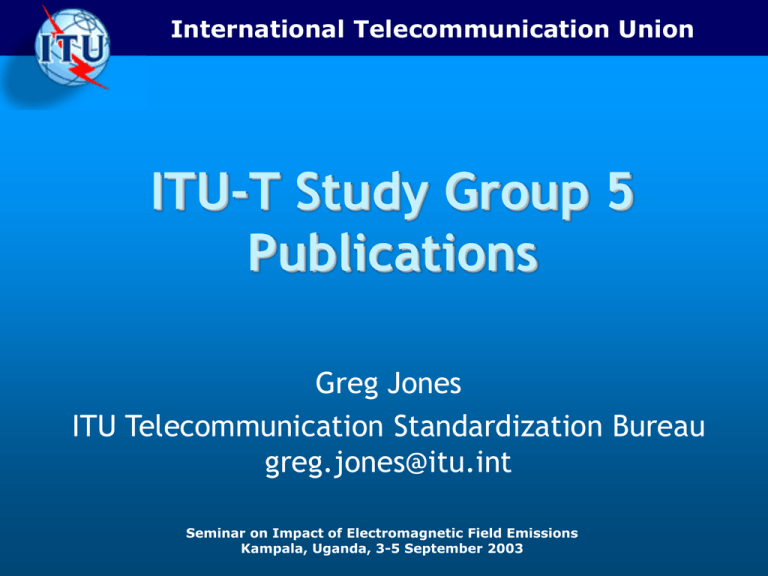
International Telecommunication Union ITU-T Study Group 5 Publications Greg Jones ITU Telecommunication Standardization Bureau greg.jones@itu.int Seminar on Impact of Electromagnetic Field Emissions Kampala, Uganda, 3-5 September 2003 ITU-T Study Group 5 “Protection against electromagnetic environment effects” o Handbooks o Directives o ITU-T K-series Recommendations Seminar on Impact of Electromagnetic Field Emissions Kampala, Uganda 3-5 September 2003 2 Guide to the use of ITU-T SG5 Publications … o o 1 Scope and objective 2 Terminology and abbreviations • • o o 2.1 Terminology 2.2 Abbreviations 3 Reference configuration 4 Electromagnetic compatibility requirements for telecommunication equipment and installations • • 4.1 General 4.2 EMC requirements for telecommunication equipment and installations in telecommunication centres and at radio installations • 4.3 EMC requirements for telecommunication equipment and installations a outdoor locations • • Seminar on Impact of Electromagnetic Field Emissions Kampala, Uganda 3-5 September 2003 • o 4.3.1 Telecommunication equipment 4.3.2 Telecommunication lines 4.4 EMC requirements for telecommunication equipment used at customer premises ANNEX - Title and abstract of ITU-T Recommendations of the K-series and other relevant Publications 3 Scope and responsibilities of the guide ITU-T ITU-R ITU-D SG 5 Recommendations Seminar on Impact of Electromagnetic Field Emissions Kampala, Uganda 3-5 September 2003 Other publications calculation/estimation testing/measuring emission resistibility/immunity protection/mitigation safety 4 T0507600-97 Reference configuration outdoor location fibre or metallic line equipment radio installation customer premises T0507610-97 Seminar on Impact of Electromagnetic Field Emissions Kampala, Uganda 3-5 September 2003 telecommunication centre 5 Locations Seminar on Impact of Electromagnetic Field Emissions Kampala, Uganda 3-5 September 2003 o Equipment (Table 1) • Telecommunication centres • Radio installations • Outdoor locations o Telecommunication lines (Table 2) • Outdoor locations o Equipment (Table 3) • Customer premises 6 Phenomena relating to equipment Seminar on Impact of Electromagnetic Field Emissions Kampala, Uganda 3-5 September 2003 o Power supply effects • Safety, resistability, immunity, mitigation o High frequency effects • Immunity, mitigation, Emmission o EFT – Electrical Fast Transient • Resistability, immunity o Lightning • Resistability, immunity o ESD – Electrostatic Discharge • Resistability, immunity 7 Phenomena relating to telecommunication lines o Power supply effects and low frequency interference • safety, resistibility, immunity o High frequency induction • immunity, mitigation, emission o Lightning Seminar on Impact of Electromagnetic Field Emissions Kampala, Uganda 3-5 September 2003 • resistibility, protection 8 Phenomena relating to customer equipment Seminar on Impact of Electromagnetic Field Emissions Kampala, Uganda 3-5 September 2003 o Power supply effects • resistability, immunity, mitigation o High frequency effects • Immunity, emission o EFT – Electrical Fast Transient • Resistability, immunity o Lightning • Resistability, immunity o ESD – Electrostatic Discharge • Immunity 9 Types and subjects of publications o Basic • general, Calculation/estimation, testing/measuring o Generic o Protection or mitigation • Overhead pairs, buried cable with metal pairs, optical fibre cable Seminar on Impact of Electromagnetic Field Emissions Kampala, Uganda 3-5 September 2003 o Safety 10 ITU-T SG5 Handbooks o Earthing of Telecommunication Installations (1976) o Guide to the use of ITU-T SG5 Publications o Interference Measurement Techniques (2002) o The Protection of Telecommunication Lines and Equipment Against Lightning Discharges Seminar on Impact of Electromagnetic Field Emissions Kampala, Uganda 3-5 September 2003 • Chapters 1 to 5 (1974) • Chapters 6, 7 and 8 (1978) • Chapters 9 and 10 (1994) 11 Directives Directives Concerning the Protection of Telecommunication Lines against Harmful Effects from Electric Power and Electrified Railway Lines Seminar on Impact of Electromagnetic Field Emissions Kampala, Uganda 3-5 September 2003 Vol I Design, construction and operational principles of telecommunication, power and electrified railway facilities Vol II Calculating induced voltages and currents in practical cases Vol III Capacitive, inductive and conductive coupling: physical theory and calculation methods Vol IV: Inducing currents and voltages in electrified railway systems Vol V Inducing currents and voltages in power transmission and distribution systems Vol VI Danger and disturbance Vol VII Protective measures and safety precautions Vol VIII Protective devices Vol IX Testing methods and measuring apparatus 12 Examples of ITU-T K-Series Recommendations Human exposure to EMF o K.52 (02/00) Guidance on complying with limits for human exposure to electromagnetic fields Resistability K.20 (02/00) Resistibility of telecommunication equipment installed in a telecommunications centre to overvoltages and overcurrents o K.21 (10/00) Resistibility of telecommunication equipment installed in customer's premises to overvoltages and overcurrents o K.44 (02/00) Resistibility tests of telecommunication equipment exposed to overvoltages and overcurrents – Basic Recommendation o K.45 (02/00) Resistibility of access network equipment to overvoltages and overcurrents o Seminar on Impact of Electromagnetic Field Emissions Kampala, Uganda 3-5 September 2003 13 ITU-T K-Series Recommendations approved in July 2003 Seminar on Impact of Electromagnetic Field Emissions Kampala, Uganda 3-5 September 2003 K.20 Resistibility of Telecommunication Equipment installed in a Telecommunications Centre to Overvoltages and Overcurrents K.21 Resistibility of Telecommunication Equipment installed in Customer Premises to Overvoltages and Overcurrents K.34 Classification of electromagnetic environmental conditions for telecommunication equipment - Basic EMC Recommendation K.43 Immunity Requirements for Telecommunication Equipment K.44 Resistibility tests for Telecommunication Equipment exposed to overvoltages and overcurrents - Basic Recommendation K.45 Resistibility of Telecommunication Equipment installed in the Access and Trunk Networks to Overvoltages and Overcurrents K.46 Protection of Telecommunication Lines using Metallic Symmetric Conductors against Lightning Induced Surges K.48 EMC requirements for each telecommunication Equipment product family recommendation 14 Recently approved ITU-T KSeries Recommendations o K.56 Protection of radio base stations Seminar on Impact of Electromagnetic Field Emissions Kampala, Uganda 3-5 September 2003 against lightning discharges o K.58 EMC, Resistibility and Safety Requirements and Procedures for Colocated Telecommunication Installations o K.59 EMC, Resistibility and Safety Requirements and Procedure for Connection to Unbundled Cables o K.60 Emission limits and test methods for Telecommunication Networks 15 ITU-T K-Series Recommendations under approval o K.57 Protection Measures for Radio Base Stations sited on Power Line Towers o K.61 Guidance to measurement and numerical prediction of electromagnetic fields for compliance with human exposure limits for telecommunication installations AAP Review period ends 5 September 2003 Seminar on Impact of Electromagnetic Field Emissions Kampala, Uganda 3-5 September 2003 16 ITU-T K-Series Recommendations o The following slides are included for reference only and do not form part of the presentation Seminar on Impact of Electromagnetic Field Emissions Kampala, Uganda 3-5 September 2003 17 K-series Recommendations Seminar on Impact of Electromagnetic Field Emissions Kampala, Uganda 3-5 September 2003 K.5 Joint use of poles for electricity distribution and for telecommunications K.6 Precautions at crossings K.7 Protection against acoustic shock K.8 Separation in the soil between telecommunication cables and earthing system of power facilities K.9 Protection of telecommunication staff and plant against a large earth potential due to a neighbouring electric traction line K.10 Low frequency interference due to unbalance about earth of telecommunication equipment K.11 Principles of protection against overvoltages and overcurrents 18 K-series Recommendations Seminar on Impact of Electromagnetic Field Emissions Kampala, Uganda 3-5 September 2003 K.12 Characteristics of gas discharge tubes for the protection of telecommunications installations K.13 Induced voltages in cables with plasticinsulated conductors K.14 Provision of a metallic screen in plasticsheathed cables K.15 Protection of remote-feeding systems and line repeaters against lightning and interference from neighbouring electricity lines K.17 Tests on power-fed repeaters using solid-state devices in order to check the arrangements for protection from external interference K.18 Calculation of voltage induced into telecommunication lines from radio station broadcasts and methods of reducing interference K.19 Joint use of trenches and tunnels for telecommunication and power cables 19 K-series Recommendations Seminar on Impact of Electromagnetic Field Emissions Kampala, Uganda 3-5 September 2003 K.20 Resistibility of telecommunication equipment installed in a telecommunications centre to overvoltages and overcurrents K.21 Resistibility of telecommunication equipment installed in costumer's premises to overvoltages and overcurrents K.22 Overvoltage resistibility of equipment connected to an ISDN T/S bus K.23 Types of induced noise and description of noise voltage parameters for ISDN basic user networks K.24 Method for measuring radio-frequency induced noise on telecommunications pairs K.25 Protection of optical fibre cables K.26 Protection of telecommunication lines against harmful effects from electric power and electrified railway lines 20 K-series Recommendations Seminar on Impact of Electromagnetic Field Emissions Kampala, Uganda 3-5 September 2003 K.27 Bonding configurations and earthing inside a telecommunication building K.28 Characteristics of semi-conductor arrester assemblies for the protection of telecommunications installations K.29 Coordinated protection schemes for telecommunication cables below ground K.30 Positive temperature coefficient (PTc) thermistors K.31 Bonding configurations and earthing of telecommunication installations inside a subscriber's building K.33 Limits for people safety related to coupling into telecommunications system from a.c. electric power and a.c. electrified railway installations in fault conditions 21 K-series Recommendations Seminar on Impact of Electromagnetic Field Emissions Kampala, Uganda 3-5 September 2003 K.34 Classification of electromagnetic environmental conditions for telecommunication equipment - Basic EMC Recommendation K.35 Bonding configurations and earthing at remote electronic sites K.36 Selection of protective devices K.37 Low and high frequency EMC mitigation techniques for telecommunication installations and systems - Basic EMC Recommendation K.38 Radiated emission test procedure for physically large systems K.39 Risk assessment of damages to telecommunication sites due to lightning discharges K.40 Protection against LEMP in telecommunications centres 22 K-series Recommendations Seminar on Impact of Electromagnetic Field Emissions Kampala, Uganda 3-5 September 2003 K.41 Resistibility of internal interfaces of telecommunication centres to surge overvoltages K.42 Analytical method to calculate visibility statistics for non-geostationary satellite orbit satellites as seen from a point on the Earth's surface K.43 Immunity requirements for telecommunication equipment K.44 Resistibility of telecommunication equipment to overvoltages and overcurrents K.45 Resistibility of access network equipment to overvoltages and overcurrents K.46 Protection of telecommunication lines using metallic symmetric conductors against lightning induced surges K.47 Protection of telecommunication lines using metallic conductors against direct lightning 23 discharges K-series Recommendations Seminar on Impact of Electromagnetic Field Emissions Kampala, Uganda 3-5 September 2003 K.48 EMC requirements for each telecommunication network equipment - Product family Recommendation K.49 Test condition and performance criteria for voice terminal subject to disturbance from digital mobile phone K.50 Safe limits of operating voltages and currents for telecommunication systems powered over the network K.51 Safety criteria for telecommunication equipment K.52 Guidance on complying with limits for human exposure to electromagnetic fields K.53 Values of induced voltages on telecommunication installations to establish telecom and a.c. power and railway operators responsibilities 24 K-series Recommendations Seminar on Impact of Electromagnetic Field Emissions Kampala, Uganda 3-5 September 2003 K.54 Conducted immunity test method and level at fundamental power frequencies K.55 Overvoltage and overcurrent requirements for insulation displacement connectors (IDC) terminations K.56 Protection of radio base stations against lightning discharges K.58 EMC, resistibility and safety requirements and procedures for co-located telecommunication installations K.59 EMC, resistibility and safety requirements and procedure for connection to unbundled cables K.60 Emission limits and test methods for telecommunication networks 25
